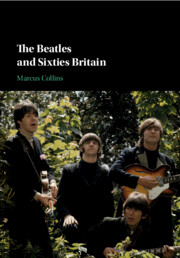Book contents
- The Beatles and Sixties Britain
- The Beatles and Sixties Britain
- Copyright page
- Contents
- Figures
- Tables
- Preface: Imagining the Beatles
- Introduction
- 1 The Other Sixties: An Anti-Permissive Permissive Society?
- 2 Society, 1963–1965: The Beatles and Modernity
- 3 Society, 1966–1970: The Beatles Go Too Far
- 4 Culture: The Beatles as Artists
- 5 Politics: The Beatles, Parliament and Revolution
- Conclusion
- Notes
- Bibliography
- Index
Conclusion
Published online by Cambridge University Press: 11 March 2020
- The Beatles and Sixties Britain
- The Beatles and Sixties Britain
- Copyright page
- Contents
- Figures
- Tables
- Preface: Imagining the Beatles
- Introduction
- 1 The Other Sixties: An Anti-Permissive Permissive Society?
- 2 Society, 1963–1965: The Beatles and Modernity
- 3 Society, 1966–1970: The Beatles Go Too Far
- 4 Culture: The Beatles as Artists
- 5 Politics: The Beatles, Parliament and Revolution
- Conclusion
- Notes
- Bibliography
- Index
Summary
The conclusion argues that, as artists and celebrities, the Beatles advanced ways of living, loving, thinking, looking, talking, joking, worshipping and campaigning which surprised and occasionally provoked their contemporaries. Sometimes explicitly and sometimes unwittingly, they created a distinctive vision which critiqued society as it was and imagined society as it could be. Reactions to the Beatles dealt with the weightiest of subjects, however glibly: the condition of modernity, the meaning of art, the relationship between state and society. The volume, range and fractiousness of disagreement about them from their rise to their demise caution against generalising about the sixties. The band served as a common reference point around which people could argue about the present state and future direction of society. By the end of the century, these disputes had faded in popular memory, as the oral history interviews conducted by the BBC for the Millennium Memory Bank demonstrate. Hindsight had smoothed out the conflicts, resolved the contradictions and marginalised the opposition. What remained was a nostalgic conception of the Beatles as representatives and progenitors of British culture at its zenith. Interviewees looked back to a halcyon age of affluence before Thatcherism, sex before AIDS and liberation before licentiousness.
Keywords
- Type
- Chapter
- Information
- The Beatles and Sixties Britain , pp. 193 - 203Publisher: Cambridge University PressPrint publication year: 2020

